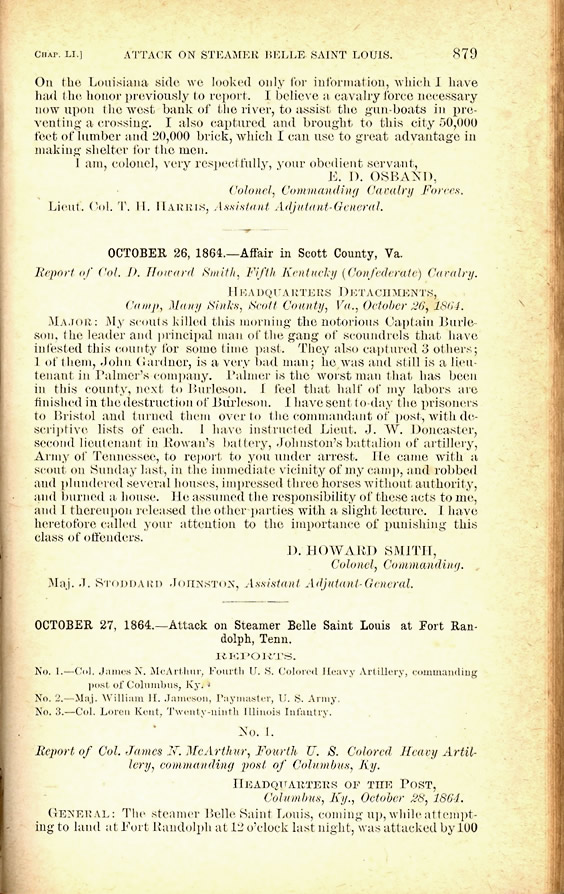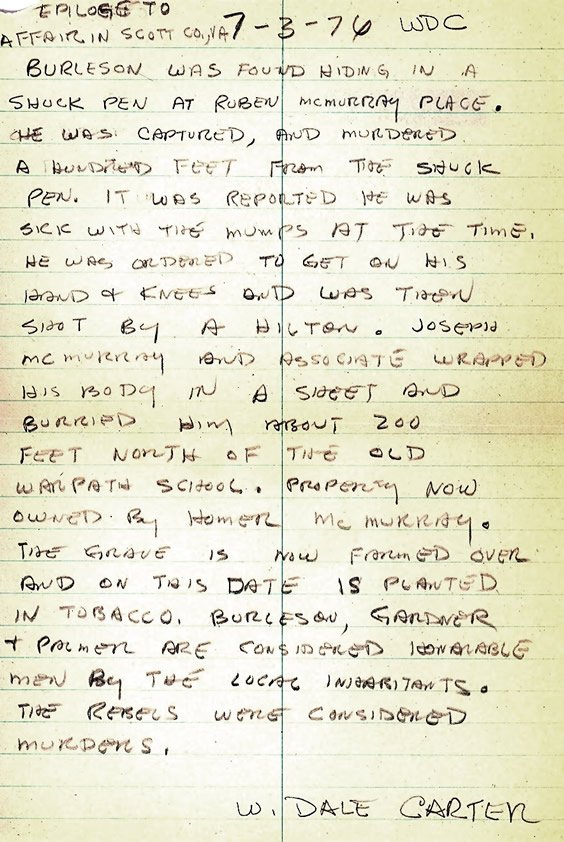|
Civil War Affair at Scott County, Virginia
by W. Dale Carter, copyright 2009
Lieutenant Doncaster's Adventure
After the surrender of Vicksburg, Mississippi, Pemberton's army was paroled, and at Enterprise, Mississippi, the troops were furnished a thirty days furlough and instructed to report at the end of that time at such places as the commanding General had designated.
About twenty five members of the Third Maryland Artillery were from East Tennessee, and at the expiration of the thirty days a number of them failed to return. During the summer of 1863, the Federals occupied a portion of East Tennessee and there was no communication by railroad between Dalton, Georgia, and Bristol, Tennessee; therefore, the only route left open for these men to return to their command was by the way of North Carolina. Captain Rowan learned that they, rather than return by that long circuitous route, had joined a cavalry company that was then operating in the neighborhood of Jonesboro, Tennessee.
It will be remembered by all who served in East Tennessee during the war, that small parties could resist the progress of a considerable force in many parts of that country, in consequence of the undulating and mountainous nature of its surface. Thousands of acres of land still retained their primitive forests, and to say that some of these forests were wild, is a mild term. Chimney Top, Log, Black and House Mountains, were some of the local names by which these mountains were known to the inhabitants who dwelt in the valleys near them. Some of the streams that meandered by them were the Watauga, Holston, Clinch, and French Broad rivers, and these steams would rise rapidly during the rain storms in the spring and fall.
The progress of the troops was often arrested by the rapid rise of these rivers, much to the chagrin of officers and men. It will readily be seen by this rapid outline that East Tennessee was a desolate country for military operations, and, to make “bad” worse, a Union sentiment prevailed to a great extent among the inhabitants of that entire section; therefore, both Union and Confederate found friends and enemies in every neighborhood.
To protect the Southern sympathizers and to arrest absentees and deserters, a considerable force of cavalry was kept there.

Captain Rowan obtained permission to send Lieutenant J.W. Doncaster, of the Third Maryland, to East Tennessee for the absentees of his battery. A leave of absence of twenty days had been granted him, but he failed to return at the expiration of that time, owing to unavoidable delays occasioned by circumstances which are as follows:
A short time after Lieutenant Doncaster arrived in East Tennessee, Captain Burlesson, of the U.S.A., who commanded a company of bushwhackers, learned that he and Birdwell, a Confederate enrolling officer, were stopping at the residence of Mr. Abraham Fleenor. One dark, stormy night, early in October 1864, Burlesson and his gang proceeded to the house of Mr. Fleenor and demanded admittance, but were peremptorily refused. He declared that if the door was not immediately opened he would beat it down. The door was not opened, and he carried his threat into execution. During this time, Lieutenant Doncaster, who was sleeping in a room on the lower floor, arose, dressed himself and went up stairs, determined if they came up to defend himself. Burlesson insisted that he should come down, but the Lieutenant told him that if he had any business with him he knew where to find him. Burlesson then said, "I know how to bring him down," and went into the next room, brought out a feather bed and cut it open, saying he would set it on fire and "smoke him down." At this juncture a young lady, one of Mr. Fleenor's daughters, speeded forward and told Burlesson he should not set the bed on fire. Whereupon he stuck her on the head with a pistol, which caused the discharge of one of the loads, that took effect in the ceiling. Still she bravely maintained her ground, determined, if possible, to prevent the "smoking" process. Lieutenant Doncaster, on hearing this contention, decided to come down, but before so, he slipped his pistol into his boot, and, cutting a hole in the lining of his coat, secreted his orders between the lining and the cloth of the coat and thus saved them.
Upon his surrender his hands were tied behind him by his captors, as were also Birdwell's, and the two were then tied together. Thus situated, they were marched fifteen miles over a rough, mountainous road. The night being a dark, stormy one, they could not see their way, and every now and then one or the other would slip down, of course bringing his fellow prisoner down with him. In this way they were considerably bruised. Birdwell was six feet six inches high, and Doncaster five feet ten, so it is easy to tell who had the worst of it. The two being tied together could not walk very rapidly, so about daylight they were separated and their hands unpinioned, that they might be enabled to quicken their pace and reach a certain point, which Burlesson was anxious to arrive at before the Confederate scouts were on the alert. Soon after his hands were untied Lieutenant Doncaster threw his pistol into a field as they were passing a fence corner. He disliked very much to part with this useful article, but it was chafing the flesh of his ankle to such an extent that he was glad to release himself from the pain which it had produced.
A few days after they reached their place of rendezvous, the men asked Burlesson's permission to take the prisoners out and shoot them. To this request Burlesson would not assent, saying that when he went to Knoxville he would turn them over to the authorities there. About this time Lieutenant Doncaster received a camp parole, but Birdwell was kept under close guard, the former being told that if he made his escape, or attempted to do so, the latter would be shot.
Burlesson's men, to pass the time, played cards and visited the Union families in the vicinity. Lieutenant Doncaster joined them in these pastimes. He possessed the faculty, to a great extent, of adapting himself to surrounding circumstances, and soon gained the confidence of Burlesson and his men, as the sequel will show.
A lady in the neighborhood brought cakes, pies and other eatables to the prisoners, and invited them to her house. Lieutenant Doncaster obtained permission to visit at this lady's house, but Burlesson was not willing that Birdwell should go. Doncaster said he was opposed to going without Birdwell, that he would be responsible for his return, and to make sure of it, a guard could accompany them.
Burlesson gave his consent, and the guard went with them. The lady at whose residence they visited, knowing the guard's propensity for strong drink, sent for some brandy, and gave him all he wanted. He partook so freely that he was, ere long, so intoxicated as to become drowsy, and finally went to sleep. Taking advantage of the insensible state of the sentinel, they left the house, accompanied by the lady, who showed them a bypath over the mountain, and, after going several miles, returned. To this lady they were indebted for their escape, and had it not been for her stratagem, they would have been marched back that night as prisoners.
They first went to Mr. Fleenor's residence, where they were joyfully received, for the family had thought of them as dead, believing they would be murdered by their captors. From there they went to Jonesboro, where they informed the authorities of what had taken place, and furnished a complete list of the names of the bushwhackers. A company of cavalry was sent to capture the gang, Lieutenant Doncaster acting as guide. They experienced considerable difficulty in finding Burlesson, but at last Lieutenant Doncaster believing that he was on the premises of a certain individual, where he was known to visit, threatened one of the servants considerably if he did not tell where he was concealed. The servant pointed to a building filled with straw. They went to the place and invited Burlesson to come out, Lieutenant Doncaster remarking that it was his turn to "smoke." On coming out, Burlesson spoke to the Lieutenant, remarking, "I am your prisoner. I treated you well when you were a prisoner of mine. I feel that I am in the hands of gentlemen and am not afraid;" to which Doncaster replied, "No, Captain Burlesson; you are not my prisoner, but a prisoner of the cavalry."
Captain Burlesson was a very bad man. He had robbed the citizens of their horses, cattle and jewelry, and in the event of their resisting, had been known to burn their houses, and commit many depredations too horrible to mention.
Lieutenant Doncaster, at the head of a squad of cavalry, arrested a Confederate officer whom he believed to belong to some bushwhacking band. Before returning to camp he was released.
On arriving at camp he was put under arrest himself for what he had done, and sent to Wytheville, Virginia, to General John C. Breckinridge's headquarters. He made a full statement of his adventures to the General, who at once released him, and ordered him to return to his command. General Breckinridge explained to General Hood, by writing on the back of Doncaster's orders, the cause of the Lieutenant's detention in East Tennessee.
References
- Southern Historical Society Papers.
- Volume XII. Richmond, Va., April, 1884. No. 4.
- Sketch of the Third Maryland Artillery.
Third Maryland Artillery
Captain, Henry B. Latrobe, Ford. O. Claiborne, John B. Rowan, Wm. L. Ritter. Lieutenants, Ferdinand O. Claiborne, W. Thompson Patten, Holmes Erwin, T. D. Giles, J.W. Doncaster. Assistant-Surgeon, Thos. J. Rogers. First-Sergeant, Rufus McCeeney. Quartermaster, A. T. Emory. Sergeants, Jas. M. Buchanan, Jr., John P. Hooper, E. H. Langley, Joseph Lackey, L. W. Frazier, J.W. Smith, Wm. Fleming, Daniel Toomey, Edw. Wynn, A. J. Davis. Corporals, B. F. Weaver, S.G.W. Gerd-ing, Jos. Edgar, M. H. I'Connell, W. H. Erwin, G. W. Hancock, T. H. Jones, J. C. Pendley, V. P. Herron, A. G. Cox, Wm. T. Sykes, W. Pirkle, B. Sanchez, S. Hylton, M. L. Welsh, Jackson Simmons, S. R. Sheppard, Wm. Buckner, John Light, Baldwin Bradford. Bugler, Frederick Geiger. Blacksmith, Nicholas Powers. Artificer, Patrick McCann, Jos. G. Fletcher. Farrier, W. B. P. Mills. The Third Maryland artillery was mustered into the service of the Confederate States January 14, 1862, at Richmond, Virginia, and immediately sent to Knoxville, Tenn. Served under E. Kirby Smith in the campaigns in Tennessee and Kentucky, being the advance battery from Lexington, Kentucky, to within three and one-half miles of Covington. After the retreat from Kentucky was sent to Vicksburg, under General Stevenson. One section, commanded by Lieut. W. T. Patten, manned the guns of the ram Queen of the West, when the Indianola was captured, and all except four were lost when the Queen was burned. Another detachment under Lieut. Wm. L. Ritter served under Col. G. W. Ferguson on Deer Creek, assisted in capturing a large Federal transport, and was afterwards under General Johnston in the battle before Jackson, Mississippi. The rest of the battery remained with Pemberton, participated in the battle of Baker's Creek, fought on the Vicksburg lines and were there surrendered. Seventy-seven were paroled, and furloughed after being exchanged. Reorganized in September, I863; went to the front at Sweetwater, Tenn., served at Lookout mountain, Missionary Ridge, and on the retreat to Dalton, Georgia. Under the title of the Stephens (Georgia) light artillery, it participated in the Atlanta campaign and Hood's campaign in Tennessee. At Nashville the battery suffered heavy loss and Captain Rowan was killed by a shell on the morning of December 16th. The company's last muster was at *******n, Mississippi, May 10, 1865.

|
